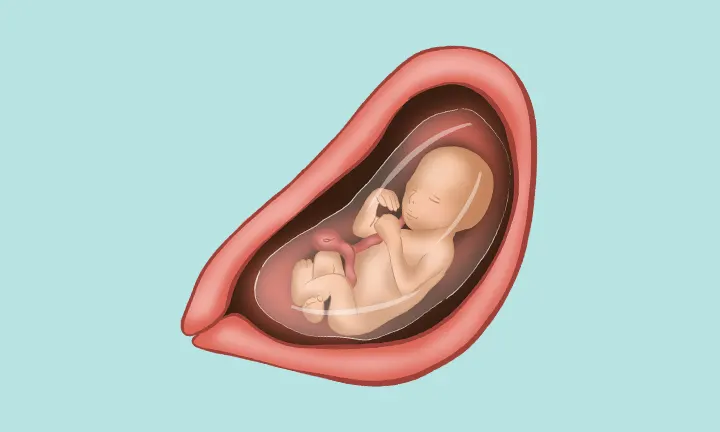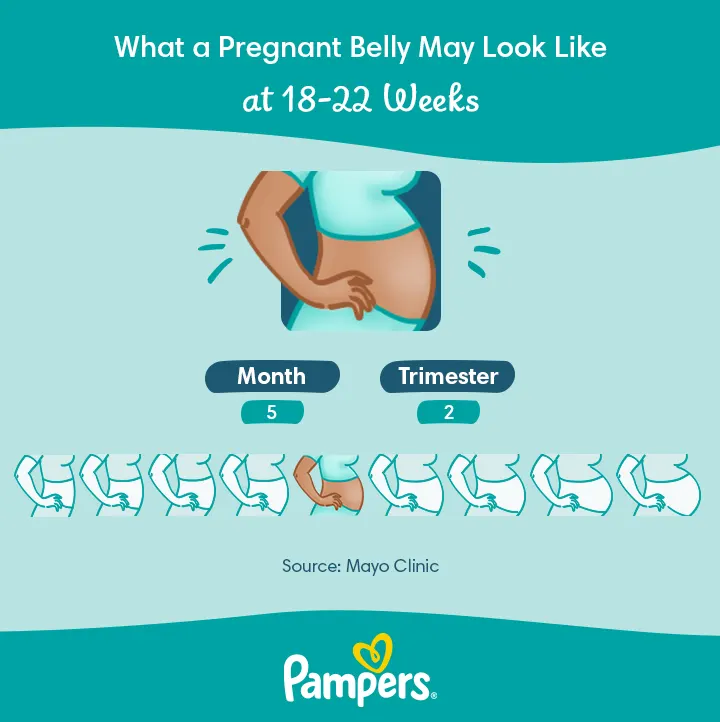19 Weeks Pregnant
At 19 weeks pregnant, you're almost halfway through your pregnancy journey. You may have already experienced some of the common symptoms of pregnancy, such as morning sickness and fatigue, but there are also exciting developments happening with your baby's growth and development. In this article, we'll take a closer look at what happens around 19 weeks pregnant, including your baby's development, possible symptoms, and important things to keep in mind as you prepare for the second half of your pregnancy journey.
Highlights at 19 Weeks Pregnant
Check out a few highlights and things to think about during week 19 of pregnancy:
Your baby is about the size of a mango at 19 weeks.
You may feel your baby moving at 19 weeks of pregnancy, but if not now, watch out for those little belly flutters in the coming weeks.
Your baby's kidneys can make urine.
With your baby bump becoming more prominent around 19 weeks pregnant, think about sending out pregnancy announcements or even planning a gender reveal if you’ve just found out the gender.
Baby names may be on your mind now that you're nearly halfway through your pregnancy. Check out our Baby Name Generator below for some inspiration:
Pregnancy Weight Gain Calculator
Fill out your details:
19 Weeks Pregnant: Your Baby’s Development
Your baby is making big developments this week and looking more and more like the little one you’re going to meet after birth! Here are some of the exciting developmental steps and changes at 19 weeks pregnant:
If you're carrying a girl, her reproductive system is already well established. The vagina, uterus, and fallopian tubes are all in place, and the ovaries contain more than 6 million primitive egg cells. That number will have dropped to about 1 million when she is born.
If you're having a boy, his testicles have formed and have been secreting testosterone since about week 10 of your pregnancy. The external genitals are continuing to grow.
The skin starts to produce a waxy coating called vernix caseosa. Made of oils secreted by the skin, dead cells, and lanugo (the fine hair that covers the body), vernix protects your little one's skin from the effects of floating in amniotic fluid. Most of it will disappear before birth, but preterm babies are often born still covered with a lot of vernix.
Your little one's kidneys have now developed enough to form urine, and the urine is excreted into the amniotic fluid.
Around the time you’re 19 weeks pregnant, your little one begins to sleep and wake in more regular patterns and may also wake up to movement and noises.
How Many Months Is 19 Weeks Pregnant?
If you’re 19 weeks pregnant, you might be wondering what that is in months. Though there are various methods of dividing the 40 weeks of pregnancy into months, when you’re 19 weeks pregnant, you’re probably five months pregnant.
How Big Is a Baby at 19 Weeks Pregnant?
When you’re 19 weeks pregnant, your baby’s size may be similar to that of a mango fruit. If you have a checkup this week (or sometime soon), your healthcare provider will probably measure the height of your uterus to check on your baby’s growth. This is called the fundal height measurement.
Your Baby: What Does 19 Weeks Pregnant Look Like?
How your baby looks at 19 weeks can be easier to imagine with the help of a visual, so check out the illustration below:
Your Body at 19 Weeks Pregnant
At 19 weeks pregnant, you may feel more aches and pains as your bump grows, and your feet might swell up a little. Or you may experience dizziness, nasal congestion, and backaches.
Still, you’ll be thrilled when you start to feel a flutter or a kick as your little one grows and starts getting active.
If you’re lucky enough to have periods of increased energy, then you might like to use those bursts to do things like putting together your baby shower registry andthinking about essential baby items you need to get before your little one arrives.
Even if you do have some extra energy, try not to overdo it. Make time to rest and relax whenever you can.
19 Weeks Pregnant: Your Symptoms
At 19 weeks pregnant, here are some of the symptoms you may be experiencing:
Skin changes. The dark patches you may have on your nose, cheeks, and forehead are a common condition of pregnancy called chloasma, or the "mask of pregnancy." Hormones are to blame for this blotchiness, which affects some pregnant women. Pregnancy hormones are also responsible for the linea nigra, the dark line running down your belly to your pubic bone. Both chloasma and the linea nigra will gradually fade after you give birth. Exposure to the sun can darken the pigments in your skin even more, so be sure to use sunscreen, wear a hat and protective clothing, or stay in the shade.
Round ligament pain. As your uterus grows, the round ligaments supporting it have to stretch. Occasionally, at 19 weeks pregnant or at another period in your pregnancy, these stretched-out ligaments may cause symptoms such as cramping, sharp pain or a dull ache, and the feeling of pressure in your lower abdomen, usually on one side or the other. It's probably most noticeable when you change positions or get up suddenly. Rest usually offers the best relief. If you’re 19 weeks pregnant and the pain comes with a fever, chills, persistent headaches, painful urination, or bleeding, or if the pain is severe.
Lower back pain. Backaches during pregnancy are very common, especially from the halfway point of your pregnancy onward. This is due to your growing uterus and the hormonal changes going on in your body. As your centre of gravity shifts, your expanding uterus strains your back muscles. You can take some measures to ease symptoms of back pain at 19 weeks pregnant, such as doing exercises that stretch and strengthen back muscles, wearing abdominal support garments, and using a heating pad to soothe sore muscles.
Congestion and nosebleeds. Around 19 weeks of pregnancy or in the weeks to come, you may find yourself with a stuffy or runny nose. Your hormone levels have increased, and your body is making extra blood, which can cause the mucous membranes in your nose to swell up, leading to congestion and maybe even nosebleeds.
Dizziness. You may feel faint, dizzy, or lightheaded at this stage of your pregnancy due to changes in your circulation. You may have less blood flow to your upper body and head. Try to avoid standing for a long time and move slowly when changing positions. Lie down on your side if you’re feeling faint and stay hydrated.
How Big Is a Pregnant Belly at 19 Weeks?
At 19 weeks pregnant your baby bump might be more obvious! Although every pregnancy is unique, you may have noticed a lot of growth in recent weeks as your uterus continues to expand. By now, your uterus might be nearly reaching your navel and you may notice changes in your centre of gravity, making you feel a bit clumsier.
Your healthcare provider will help you if you’re worried about weight gain. You can also use our Pregnancy Weight Gain Calculator to help you stay on track.
Whether you're showing much or not, you may be curious to know if you can feel your baby move at 19 weeks. Around 18 to 20 weeks you may feel your baby move for the first time, and these tiny belly flutters are known as quickening. If you're sensing this type of fetal movement at 19 weeks, you can expect those sensations to become stronger and easier to detect as your baby continues to grow.
What Does 19 Weeks Pregnant Look Like?
For a better idea of what your pregnancy belly might look like around 19 weeks, when you’re in your fifth month of pregnancy, check out the image below.
19 Weeks Pregnant: Things to Consider
As your pregnancy progresses, you have a lot to do and a lot to think about, from staying fit and healthy to getting a good night’s sleep. Check out our list below.
Get moving—every little bit of gentle exercise helps. Exercise is beneficial for you and your baby, among other things helping to reduce stress levels. It's important not to overdo it, however. Walking, swimming, and even yoga or Pilates are great choices during pregnancy. Remember to wear shoes with good support and a well-fitted sports bra when exercising. Your healthcare provider can help you find the right form of exercise during your pregnancy.
As your bump gets bigger, you may find it’s getting in the way of a good night’s rest, leaving you feeling exhausted at 19 weeks pregnant and as your pregnancy develops. Sleeping on your back from the second trimester onward puts weight on your spine and back muscles, and it can also compress major blood vessels, which can leave you feeling dizzy. Try to sleep on your side with both legs bent, and place a pillow between your knees. You can also put a pillow under your belly. If you wake up in the middle of the night on your back, just go back to sleeping on your side. Learn more about sleeping while pregnant throughout the trimesters.
If someone is throwing you a baby shower in the third trimester, it’s time to get your shower registry organized! The host of your shower will want to include the details to include in the invitations, and the invitations will need to be sent out well in advance to give guests enough time to set aside the date and buy a gift. Use our interactive baby registry checklist to help you remember to register for everything you’ll need.
Use this time to think about what baby gear you’ll need and to shop around so that you know which specific products you’d like (whether it’s to register for, or to buy yourself). Ask other parents for advice and look at product reviews. You can also look at the best diapers to choose for your baby.
If you want to find out your baby’s gender, you'll likely have this opportunity at around 18, 19, or 20 weeks during the mid-pregnancy ultrasound exam. Until then, have some lighthearted fun and guess your baby’s gender with our Guess Your Baby’s Gender Quiz.
Tip for Partners Is your pregnant partner tossing and turning, finding it hard to get comfortable at night? Why not get some extra pillows for them to use between their legs or under their bump, as suggested in our 16 weeks article. Adding more pillows is an easy way to help create a cozy and relaxing bedroom environment that’s conducive to a good night’s sleep. |
19 Weeks Pregnant: Consult Your Healthcare Provider
Your healthcare provider is always there for you, so feel free to consult them about any questions or concerns you have now and in the weeks to come. Some common questions at 19 weeks pregnant include:
What is the size and position of the baby at 19 weeks pregnant?
What exercise is safe at this stage of pregnancy?
What could be the cause of uncomfortable symptoms like severe back pain, abdominal pain, painful urination, or fever at 19 weeks pregnant?
What causes light spotting at 19 weeks pregnant?
What is the normal heart rate of a pregnant person at 19 weeks? It’s normal for your heart to beat faster during pregnancy to help deliver oxygen and nutrients through the placenta to your baby. If you have any concerns about your heart rate or you have shortness of breath, contact your healthcare provider.
What are the risks and benefits of any genetic tests that may be offered during the second trimester, including amniocentesis?
Will a mid-pregnancy ultrasound exam be performed at 19 weeks, and what information will it provide?
FAQS AT A GLANCE
Here are some developments that might be taking place inside your belly at 19 weeks pregnant:
- Your baby is growing and they’re about the size of a mango
- Baby’s kidneys are able to start making urine
- Your little one is moving around and you may be able to feel their movements
- Their skin is starting to produce vernix caseosa, a creamy film that acts as a protective layer.
19 Weeks Pregnant: Your Checklist
□ Use sunscreen, wear hats and protective clothing, or stay in the shade if going outside.
□ Talk to your healthcare provider about an exercise plan.
□ Rest frequently, especially if you’re experiencing round ligament pain.
□ Start your search for a pediatrician
19 weeks pregnant - checklist
How We Wrote This Article The information in this article is based on the expert advice found in trusted medical and government sources, such as the American Academy of Pediatrics and the American College of Obstetricians and Gynecologists. You can find a full list of sources used for this article below. The content on this page should not replace professional medical advice. Always consult medical professionals for full diagnosis and treatment.


